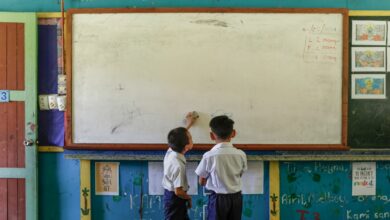Not surprised. Just sad. A recent poll shows that 28% of young people in Malaysia have experienced online bullying. Most said it happened through online games, private chats, or on social media apps like Facebook, Instagram, WhatsApp, YouTube, and Twitter.
These Malaysian youth were among 170,000 U-Reporters aged 13–24 from 30 countries who shared their views with UNICEF using U-Report, a youth engagement platform. The global findings were released by UNICEF and the UN Special Representative of the Secretary-General (SRSG) on Violence against Children, as part of the #ENDviolence campaign.
What the numbers say
Here’s what young people in Malaysia told us:
- 4 in 9 know about private online groups used to bully others.
- Only 2 in 7 know where to get help if they face online bullying or online violence.
- Globally, 1 in 5 say they’ve skipped school because of cyberbullying or online threats.
“When asked who should stop cyberbullying, young people gave mixed answers – some said governments, others said internet companies or young people themselves,” said Najat Maalla Mjid, the UN SRSG on Violence against Children. “The truth is we all share the responsibility.”
Who’s responsible? Everyone.
Globally, the poll found:
- 32% said governments should step in.
- 31% pointed to young people.
- 29% said tech companies need to do more.
In 2018, young people from around the world created the #ENDviolence Youth Manifesto. Their message? Everyone – governments, teachers, parents, and youth – must work together to stop violence in and around schools, and protect students online too.
“All over the world, young people are telling us they’re being bullied online. It’s hurting their education. They want it to stop,” said UNICEF Executive Director Henrietta Fore. “As we celebrate CRC30, children’s rights must be at the heart of online safety policies.”
So what needs to happen?
UNICEF and its partners are calling for urgent action to stop online bullying and violence in schools. Here’s what they want:
- Strong laws and policies to protect young people from bullying.
- National helplines for children who need help.
- Ethical data practices from social media platforms.
- More research on how children behave online.
- Training for teachers and parents to respond to bullying, especially for vulnerable kids.
Malaysia, we’ve started.
From 1–3 October 2019, the Ministry of Education, Project I.D., and UNICEF are hosting the Kita Peduli Youth Camp. Forty students aged 13–17 will come together to write recommendations for an Anti-Bullying School Policy.
They’ll present their ideas during a KidsTakeover event on World Children’s Day to mark the 30th anniversary of the Convention on the Rights of the Child.
Your turn.
Do these poll results reflect what you see in real life? Got thoughts? Drop your comments below. Let’s talk about how to make the internet safer for everyone.





thank you for sharing